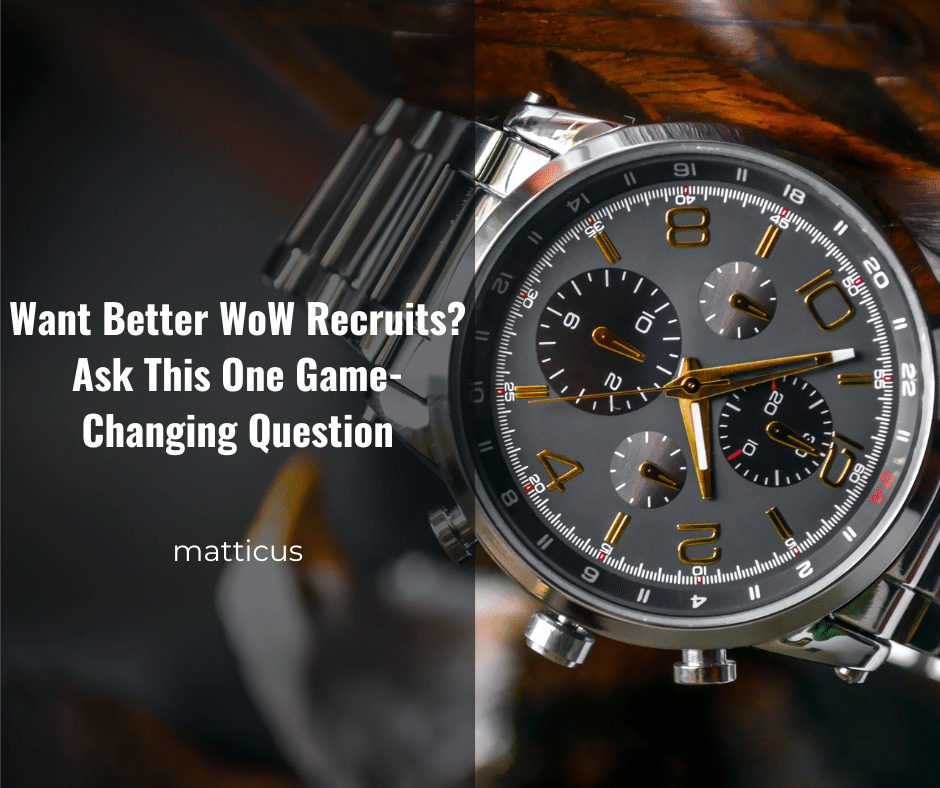When recruiting for a serious raid team, we often get caught up in logs, past achievements, and class comp. But there’s one deceptively simple question that cuts through all of that and reveals way more than people realize:
“How often do you play during the week?”
It’s not flashy. It’s not technical. But what about the answer you get? That tells you nearly everything you need to know about how this player is going to perform on your team.
Why Play Time Tells You Everything
Someone can have great parses and a nice raider.io score, but if they log on twice a week (once to raid and once to check the auction house), you’re going to run into problems. Quickly.
This question uncovers:
- Whether they’re actively maintaining their character
- If they’re engaged with current content
- How much effort do they put into staying raid-ready
- Whether they treat WoW like a hobby or like a team sport
If someone isn’t putting in time, they’re likely falling behind in one or more critical areas: gear optimization, dungeon keys, renown progression, consumable prep, or simply staying in rhythm with the game.
The Raid-Only Raider vs. The Team-Oriented Raider
It’s the classic split.
Some players treat raiding like clock-in, clock-out shift work. They show up for pulls but never put in work outside of it.
That may be fine for more casual groups.
But if you’re trying to push Cutting Edge, that’s a liability.
CE raiders are expected to:
- Run high-level dungeons to cap crests and upgrade gear
- Push reputation and renown, especially in the Liberation of Undermine, where buffs and perks are tied to progression systems
- Hit at least 4 high-level M+ dungeons weekly to unlock vault choices (naturally this tapers off towards the end of the season)
- Keep up with class tuning, encounter changes, and meta shifts
If you’re behind in any of these areas, you’re dragging the team down. It doesn’t matter how well you parse if your trinkets are outdated and your weapons are 20 item levels behind.
This One Question Saves You Time and Headaches
Ask it early during the interview process.
You’ll avoid weeks of frustration when someone underperforms due to poor prep. You’ll spare your leadership team awkward “why aren’t you doing your keys” DMs. And most importantly, you’ll align expectations right from the start.
This question:
- Filters out raid passengers
- Opens the door to honest conversations about commitment
- Helps you recruit for long-term fit, not just short-term performance
Red Flags vs. Green Flags
Here’s what to listen for:
Red Flags:
- “I mostly just log in for raid nights.”
- “I haven’t done any M+ this season.”
- “I’m not really into the grind anymore.”
Green Flags:
- “I’m usually online a few nights a week running keys or helping friends.”
- “I’ve been working on Undermine rep (or other rep).”
- “I try to push keys and get my rating up.”
Consistency beats bursts of greatness. You want players who are present, proactive, and part of the team beyond just showing up on time.
Ask the Question. Always.
It’s easy to teach better positioning. You can improve execution. You can implement assignments and cooldowns to the point it becomes second nature. But you can’t teach someone to care enough to log in and improve their character. Player skill is a big part of the equation, but effort is another unit of measure.
Before you get dazzled by logs, ask the real question:
“How often do you play?”
It might be the most honest answer you get in the whole conversation.
